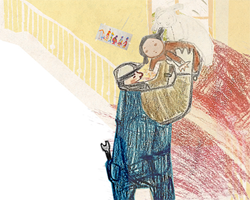Educating children about sexual abuse through storytelling – Estonia

WHO/Kristi Kangilaski
We read to children to teach them about kindness and love. We read to children to teach them about their planet, bodies and health. We tell them about feelings and how to navigate them. We arm them with vocabulary that helps them to express themselves. Through literature, we can teach our children about many complex topics and empower them to speak out.
However, one of the most difficult topics to talk to children about is violence and sexual abuse. Many parents and teachers feel ill-equipped to discuss such sensitive and complex themes with children. Nevertheless, the topic is important – in the WHO European Region, an estimated 18 million children are affected by sexual violence each year. And this is only the tip of the iceberg, as sexual violence frequently goes unreported.
In Estonia, the Ministry of Justice and the nongovernmental organization Estonian Union for Child Welfare commissioned writer Juhani Püttsepp to tackle this challenge. “Mina olen enda oma” (“I am my own”) was the result. This beautifully illustrated book deals with themes such as body ownership, good and bad touch, and how to recognize abusive situations, say no and disclose abuse to a trusted adult. The book was distributed in kindergartens and schools across Estonia for children up to the age of 10.
Brit Tammiste from the Ministry notes, “The book is written empathetically and speaks about important daily topics for children that may be tricky for grownups to explain. It provides solutions, often accompanied with the warm support of a trusted person. Juhani Püttsepp took his time to study sexual abuse prevention and methodically crafted the characters and situations.”
The book empowers children to describe and recognize problematic situations. In the words of Püttsepp: “Kristi Kangilaski’s illustrations helped a lot – they are peaceful and provide hints, answers and solutions.”
“Mina olen enda oma” comes with a guidebook for adults on recognizing, discussing and responding to children’s concerns. This gives adults the vocabulary to discuss the complex situation of sexual abuse. The book has been widely accepted and commended by teachers and parents, and is now in its second edition.
Overall, the book educates children, carers, teachers and parents in subtle ways. It makes children more aware and conscious of their boundaries and bodies without scaring them, and makes responsible adults more capable of helping. This is particularly important in a school setting.
The 2018 “European status report on preventing child maltreatment” recommends schools as a “logical setting in which to educate and empower children to avoid and report situations of abuse without stigmatizing high-risk individuals”. Recognition of harmful situations and inappropriate contact needs to go beyond literature and be proactively enforced by teachers in schools.
In WHO’s video “Prevent child abuse and neglect”, one affected individual explains, “What could have made the biggest difference would have been if the grownups that were supposed to look after me listened to me, talked to me and spent time with me.”
The “Mina olen enda oma” project was led by the Estonian Union for Child Welfare and funded by the Estonian Ministry of Justice.



